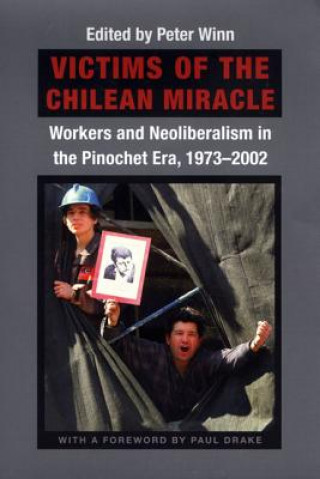
Code: 04937972
Victims of the Chilean Miracle
Chile was the first major Latin American nation to carry out a complete neo-liberal transformation. Its policies--encouraging foreign investment, privatizing public sector companies and services, lowering trade barriers, reducing ... more
- Language:
 English
English - Binding: Paperback
- Number of pages: 448
Publisher: Duke University Press, 2004
- More about this

36.71 €
RRP: 40.85 €
You save 4.14 €

Low in stock at our supplier
Shipping in 14 - 18 days
Potřebujete více kusů?Máte-li zájem o více kusů, prověřte, prosím, nejprve dostupnost titulu na naši zákaznické podpoře.
Add to wishlist
You might also like
-

Visual Mba
19.47 € -8 % -

Recent Advances in Abrasives Research
224.79 € -17 % -

Final Fantasy XV Official Works
33.47 € -17 % -

Choice Theory
13.58 € -14 % -

What's the Point of Maths?
15.41 € -28 % -

C++ All-in-One For Dummies, 4th Edition
31.64 € -31 % -

Vice Versa Tarot Deck
20.28 € -18 % -

Evangelion Illustrations 2007-2017
28.60 € -20 % -

Kissinger the Negotiator: Lessons from Dealmaking at the Highest Level
16.32 € -19 % -

Konosuba: God's Blessing on This Wonderful World!, Vol. 7 (light novel)
11.55 € -24 % -
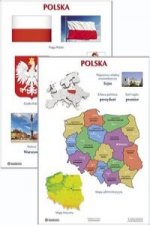
Plansza Polska
9.02 € -5 % -

Genesis 1967 to 1975
31.84 € -9 % -

Hoshin Engi, Vol. 3
7.50 € -20 % -

Japanese Wood Blocks (ukiyo-e): 100 Postcards
16.83 € -9 % -

Mr. Man
20.28 € -18 % -

Fugitive Emissions & Seals
61.36 € -17 % -

Letters and Papers, Foreign and Domestic, of the Reign of Henry VIII: Volume 3, Part 2.1
86.42 € -

Epidemiological and Statistical Aspects of the AIDS Epidemic
70.29 € -4 % -

Tax-Deductible Wedding
15.10 € -17 % -

Reflective Planning Journal for School Leaders
76.07 € -

Winsford
8 € -9 % -

SolarWinds Orion Network Performance Monitor
68.36 € -

Bescherelle Le coffret de la langue française
37.83 € -

The Quintessential Quintuplets 07
6.48 € -14 % -

Amazon Echo Spot - Inoffizielles Handbuch: Das Ultimative Handbuch Zum Echo Spot Mit Alexa, Anleitungen, Erklärungen, Tipps & Tricks, Zubehör + Ifttt
30.42 € -1 % -

Apartament w Paryżu
9.73 € -

KuschelRock Christmas
29.31 € -

Ghostbusters/Teenage Mutant Ninja Turtles
15.61 € -9 %
Give this book as a present today
- Order book and choose Gift Order.
- We will send you book gift voucher at once. You can give it out to anyone.
- Book will be send to donee, nothing more to care about.
More about Victims of the Chilean Miracle
You get 92 loyalty points
 Book synopsis
Book synopsis
Chile was the first major Latin American nation to carry out a complete neo-liberal transformation. Its policies--encouraging foreign investment, privatizing public sector companies and services, lowering trade barriers, reducing the size of the state, and embracing the market as a regulator of both the economy and society--produced an economic boom that some have hailed as a "miracle" to be emulated by other Latin American countries. But how have Chile's millions of workers, whose hard labor and long hours have made the miracle possible, fared under this program? Through empirically grounded historical case studies, this volume examines the human underside of the Chilean economy over the past three decades, delineating the harsh inequities that persist in spite of growth, low inflation, and some decrease in poverty and unemployment. Implemented in the 1970s at the point of the bayonet and in the shadow of the torture chamber, the neoliberal policies of Augusto Pinochet's dictatorship reversed many of the gains in wages, benefits, and working conditions that Chile's workers had won during decades of struggle and triggered a severe economic crisis. Later refined and softened, Pinochet's neo-liberal model began, finally, to promote economic growth in the mid-1980s, and it was maintained by the center-left governments that followed the restoration of democracy in 1990. Yet, despite significant increases in worker productivity, real wages stagnated, the expected restoration of labor rights faltered, and gaps in income distribution continued to widen. To shed light on this history and these ongoing problems, the contributors look at industries long part of the Chilean economy--including textiles and copper--and industries that have expanded more recently--including fishing, forestry, and agriculture. They not only show how neoliberalism has affected Chile's labor force in general but also how it has damaged the environment and imposed special burdens on women. Painting a sobering picture of the two Chiles--one increasingly rich, the other still mired in poverty--these essays suggest that the Chilean miracle may not be as miraculous as it seems. Contributors: Paul Drake; Volker Frank; Thomas Klubock; Rachel Schurman; Joel Stillerman; Heidi Tinsman; Peter Winn
 Book details
Book details
Book category Books in English Economics, finance, business & management Industry & industrial studies Industrial relations, health & safety
36.71 €
- Full title: Victims of the Chilean Miracle
- Subtitle: Workers and Neoliberalism in the Pinochet Era, 1973-2002
- Language:
 English
English - Binding: Paperback
- Number of pages: 448
- EAN: 9780822333210
- ISBN: 082233321X
- ID: 04937972
- Publisher: Duke University Press
- Weight: 646 g
- Dimensions: 185 × 235 × 33 mm
- Date of publishing: 20. July 2004
Trending among others
-

Naked Pilot
19.37 € -20 % -

Seasonal Associate
14.70 € -19 % -

Working Class Politics In The German Revolution (historical Materialsim, Volume 77)
35.70 € -

Heteromation, and Other Stories of Computing and Capitalism
38.64 € -16 % -

Managing the Risks of Organizational Accidents
56.90 € -

Health and Safety at Work
59.23 € -2 % -

Safety Differently
66.33 € -

Health and Safety Pocket Book
47.06 € -

Public Safety Bomb Suit Standard & Certification Program Requirements
194.86 € -17 % -

Engineering a Safer World
44.42 € -16 % -

Handbook of Industrial Hazards and Safety
147.59 € -7 % -

Warehouse Safety
178.43 € -

Safety Culture
98.49 € -

Pride
11.35 € -28 % -

Guidelines for Risk Based Process Safety
217.08 € -

OHSAS 18001 Step by Step
16.63 € -

Violence of Financial Capitalism
12.47 € -18 % -

Occupational Safety and Health for Technologists, Engineers, and Managers, Global Edition
97.38 € -
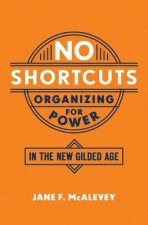
No Shortcuts
21.50 € -6 % -

Working in Biosafety Level 3 and 4 Laboratories - A Practical Introduction
117.97 € -

Security Management for Occupational Safety
127.91 € -
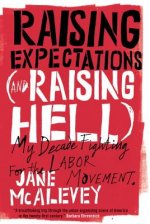
Raising Expectations (and Raising Hell)
22.10 € -4 % -

Ultimate Desert Handbook
26.37 € -14 % -

Human Contribution
66.33 € -

Guidelines for Safe Process Operations and Maintenance
153.37 € -

Wobblies of the World
33.87 € -

Settled Asbestos Dust Sampling and Analysis
315.38 € -

Hamilton & Hardy's Industrial Toxicology 6e
230.87 € -

Lean Safety Gemba Walks
56.09 € -

Definitive Guide to Behavioural Safety
72.83 € -

Sick Building Syndrome
157.23 € -

Wobbly Life
25.55 € -1 % -

Workplace Health Promotion Programs - Planning, Implementation, and Evaluation
112.29 € -

Laser Safety
279.47 € -

Ergonomics and Musculoskeletal Disorders (MSDs) in the Workplace
140.49 € -

Pew and the Picket Line
120.20 € -9 % -

On the Ground
32.05 € -10 % -

Jobless Future
35.70 € -

Safety Critical Systems Handbook
183.20 € -

Decisions Over Decimals - Striking the Balance between Intuition and Information
28.50 € -20 % -

Chemistry of Pyrotechnics
125.07 € -
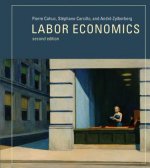
Labor Economics
135.92 € -

Health & Safety at Work For Dummies
21.90 € -18 % -

Negotiation: From Theory to Practice
187.36 € -

Normal Accidents
41.99 € -

Trench Rescue
145.66 € -

HAZOP: Guide to Best Practice
98.59 € -

Homestead Strike of 1892
22.71 € -18 % -

Crane Safety
168.69 €
Collection points Bratislava a 2642 dalších
Copyright ©2008-24 najlacnejsie-knihy.sk All rights reservedPrivacyCookies


 15549 collection points
15549 collection points Delivery 2.99 €
Delivery 2.99 € 02/210 210 99 (8-15.30h)
02/210 210 99 (8-15.30h)